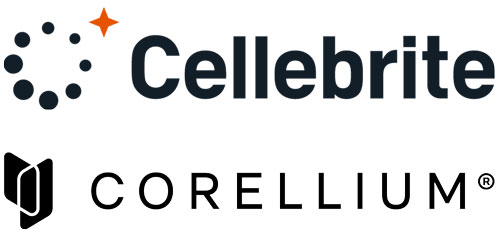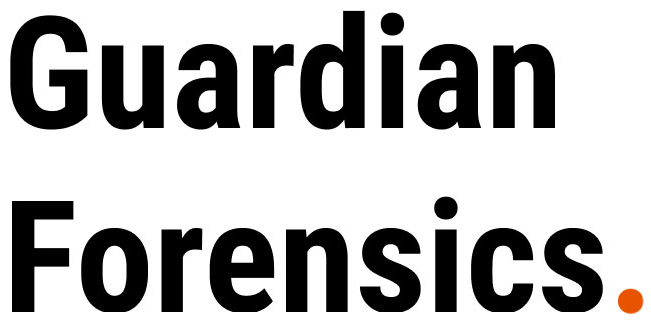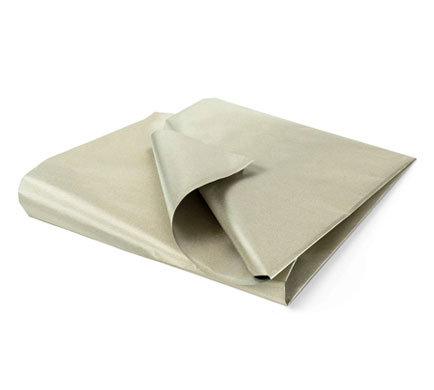
MISSION DARKNESS TitanRF Faraday Fabric
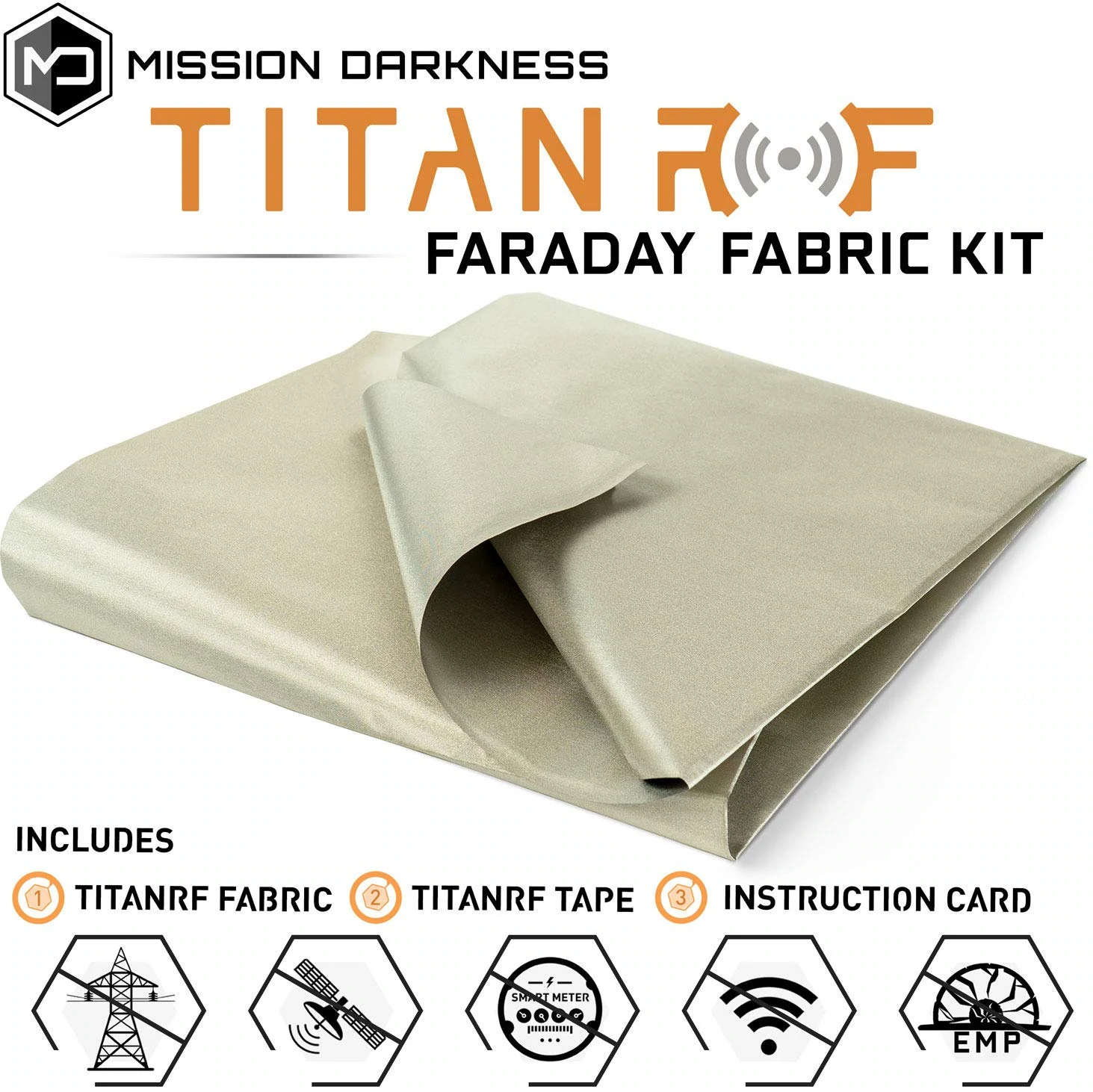
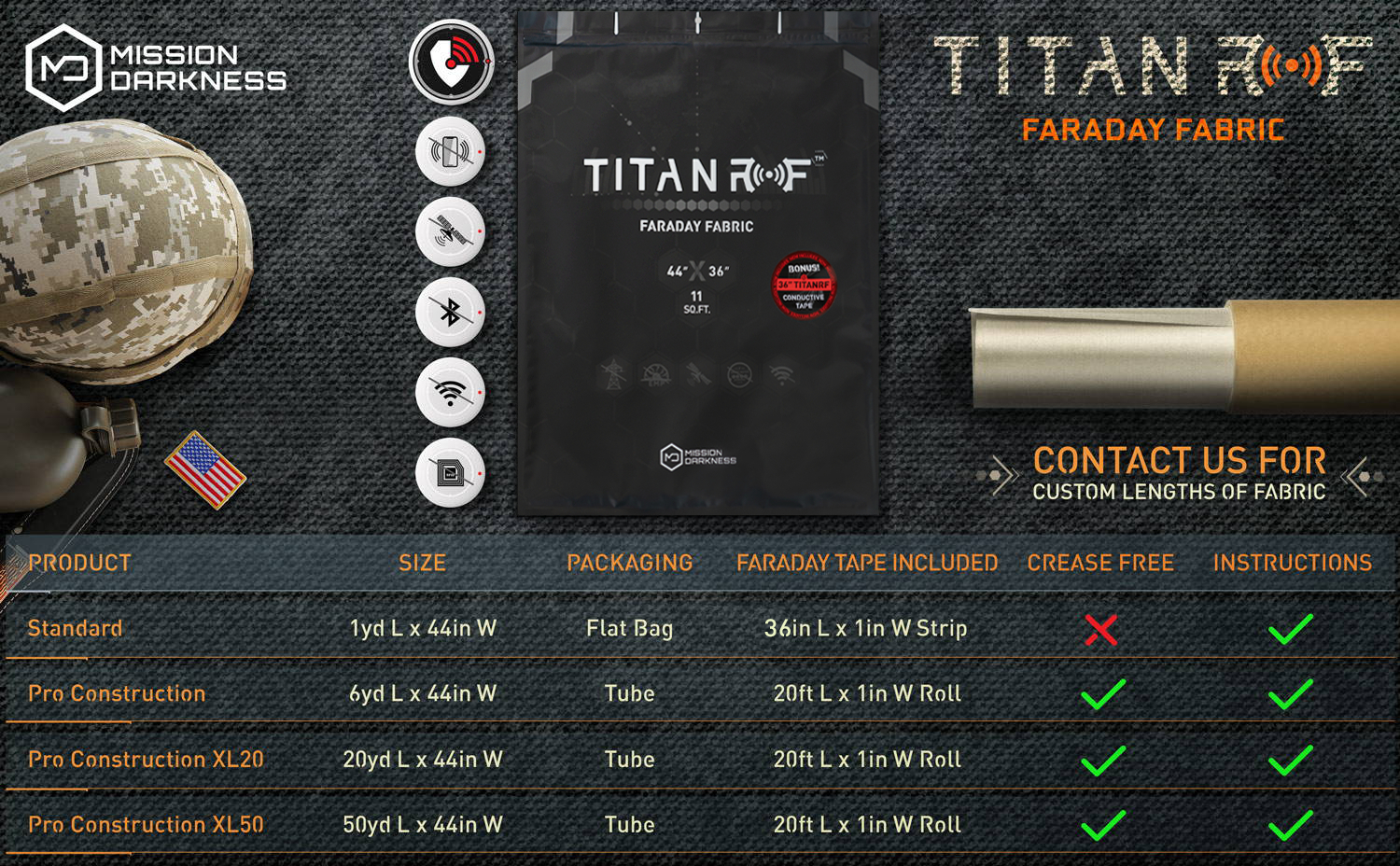
Use TitanRF™ Faraday Fabric to Create Your Own RF Shielding Enclosure
Mission Darkness TitanRF™ Faraday Fabric offers the next generation of faraday shielding and is certified to military standards MIL STD 188-125, as well as IEEE 299-2006. The lab certifications not only ensures that the fabric shields against high-altitude electromagnetic pulses (HEMPs) and related occurrences, such as coronal mass ejections (CMEs), electrostatic discharges (ESDs), and solar flares, but provides concrete proof to the shielding ability and effectiveness of the fabric.
TitanRF Faraday Fabric uses a copper and nickel composition to achieve an average attenuation of 80dB-120dB from low MHz all the way up to 40GHz. This is the same fabric that is used by military and law enforcement forensics investigators to block all wireless signals, including cell phone, WiFi, Bluetooth, and GPS. It is also used by civilians for EMP protection, personal data and identity protection, signal isolation in secure facilities, RF isolation for hardware and software testing, harmful EMF radiation reduction, anti-credit card skimming, digital privacy, and more.
The fabric can be easily cut, sewn, or taped to surfaces for creating DIY faraday cages or RF shielding enclosures. The fabric comes with a sample of TitanRF Faraday Tape which can be used to tape together layers of TitanRF Faraday Fabric (see specific included items in each fabric kit). Once the faraday enclosure is constructed, you can use our faraday testing apps to confirm your design is properly shielding (see below). Read our TitanRF Faraday Fabric FAQ for usage tips and answers to commonly asked questions regarding using the material for faraday cages and RF shielded enclosures. *Contact us if you need custom dimensions or a full roll or fabric.
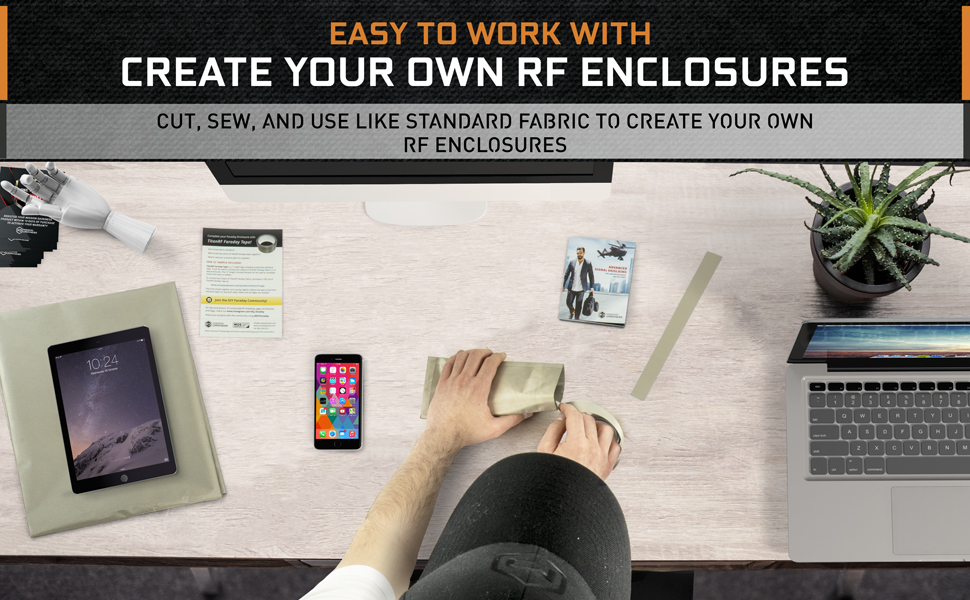
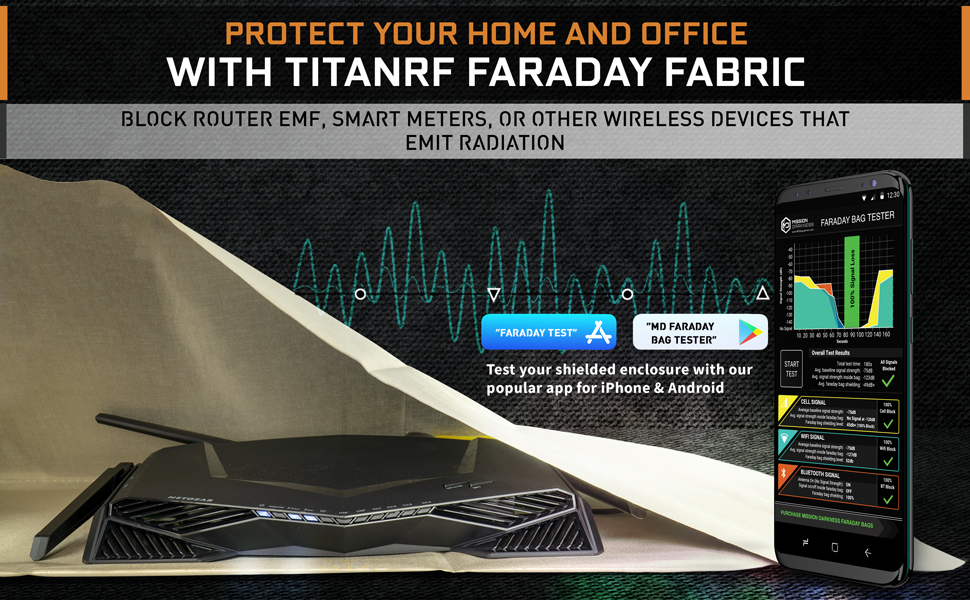
Features
- High shielding (not mid-grade shielding) material for blocking RF signals such as WiFi, cell signals including 5G networks, GPS, Bluetooth, RFID, NFC, and radio signals with 80dB-120dB average attenuation from low MHz to 40GHz
- EMI, EMR, and EMF shielding
- Polyester fiber, metallic copper, and metallic nickel composition
- Lab tested and certified MIL STD 188-125 (compliant for high altitude EMP resistance), as well as IEEE 299-2006 (shielding effectiveness standards)
- Surface resistance approximately .5 Ohm/sq
- Lightweight and extremely durable
- High grade corrosion and tarnish resistance
- Easy to work with – cut, sew, and use like standard fabric in your industrial (military, construction company, IOT developer, etc.), or DIY (consumer) project
- Multiple fabric length sizes available in the drop down menu – options include Standard (11 sq ft), Pro Construction Kit (66 sq ft), Pro Construction Kit XL20 (220 sq ft), and Pro Construction Kit XL50 (550 sq ft)
- Primary applications include shielding electronic devices from RF signals, defense against EMPs, protection against EMF/EMI radiation, construction for signal proof rooms or tents, data security, and to enhance digital privacy
Commonly Used to Shield
- Generators and solar panels
- Electronic medical equipment
- Survival gear and power tools
- Hard drives
- Two-way radios
- Digital cameras
- GPS units
- Smart meters
- Entire rooms (wall covering)
- Cell phones
- Tablets
- Laptops
- Keyfobs
- Credit cards and building access cards
- Smart home appliances
- Routers
- Satellites
Use Our FREE Faraday Testing App
The Mission Darkness app lets you test shielding effectiveness of your faraday projects. The Android app, called “MD Faraday Bag Tester” or iPhone app called, “Faraday Test” uses your phone’s WiFi, cell, and Bluetooth antennas to measure dB shielding.
Frequently Asked Questions
The “Do-It-Yourself” shielded enclosure FAQ page includes answers to frequently asked questions and best practices related to using Mission Darkness TitanRF Faraday Fabric for building RF shielding enclosures.
Safety
TitanRF Faraday Fabrics, tapes, and other products including these items are made with metals such as copper and nickel. As such, they are conductive and also flammable. Keep these items away from outlets, plugs, cables, and any sources of electricity to reduce the chance of fire. Contact us if you have questions or concerns about your project.
Multiple Size Options Available
Standard Kit (1 Yard) Includes
- TitanRF Faraday Fabric measuring 36in long x 44in wide / 11 sq ft / 1.22 sq yards
- Packaged folded in a flat bag
- 36in long x 1in wide sample strip of TitanRF Faraday Tape
- Usage instructions
Pro Construction Kit (6 Yards) Includes
- TitanRF Faraday Fabric measuring 18ft long x 44in wide / 66 sq ft / 7.33 sq yards
- Packaged rolled in a tube and crease free
- 20ft long x 1in wide roll of TitanRF Faraday Tape
- Usage instructions
Pro Construction Kit XL20 (20 Yards) Includes
- TitanRF Faraday Fabric measuring 60ft long x 44in wide / 220 sq ft / 24.44 sq yards
- Packaged rolled in a tube and crease free
- 20ft long x 1in wide roll of TitanRF Faraday Tape
- Small (4-pack) TitanRF Faraday Patch
- Nitrile gloves
- Usage instructions
Pro Construction Kit XL50 (50 Yards) Includes
- TitanRF Faraday Fabric measuring 150ft long x 44in wide / 550 sq ft / 61.11 sq yards
- Packaged rolled in a tube and crease free
- 20ft long x 1in wide roll of TitanRF Faraday Tape
- Small (4-pack) and Medium (2-pack)TitanRF Faraday Patch
- Nitrile gloves
- Usage instructions
Custom Length or Full Roll
Contact us for a quote if you are looking for a custom length or full roll of fabric.
Instruction Sheet Included
To ensure maximum success with your RF/EMF/signal blocking project, make sure your expectation is understood and met. For example, EMF reduction is very different than complete signal blockage. Every signal environment is different, and the methods of accomplishing your goals may vary based on the environment and your desired result. To reduce EMF, you may simply need to cover a few walls or your device with TitanRF Faraday Fabric. To completely eliminate Wi-Fi, however, may require construction of a full faraday cage with 100% conductive surfaces and zero penetrations. These are vastly different projects with different challenges. You must understand what you’re looking to accomplish to achieve the right result. If you are not clear on what you are trying to accomplish, feel free to contact us to discuss your project. An instruction sheet with more details is included to help with your project.
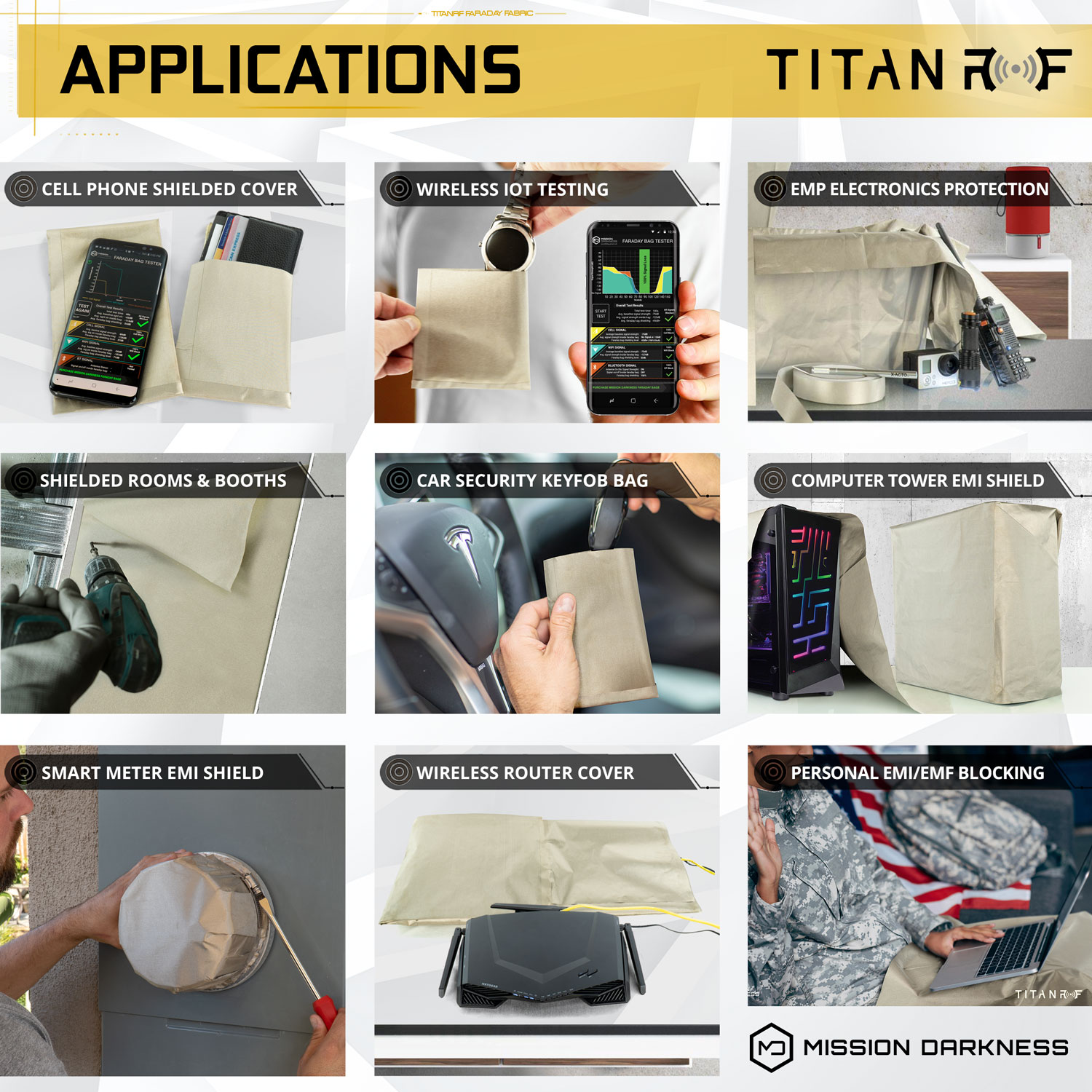
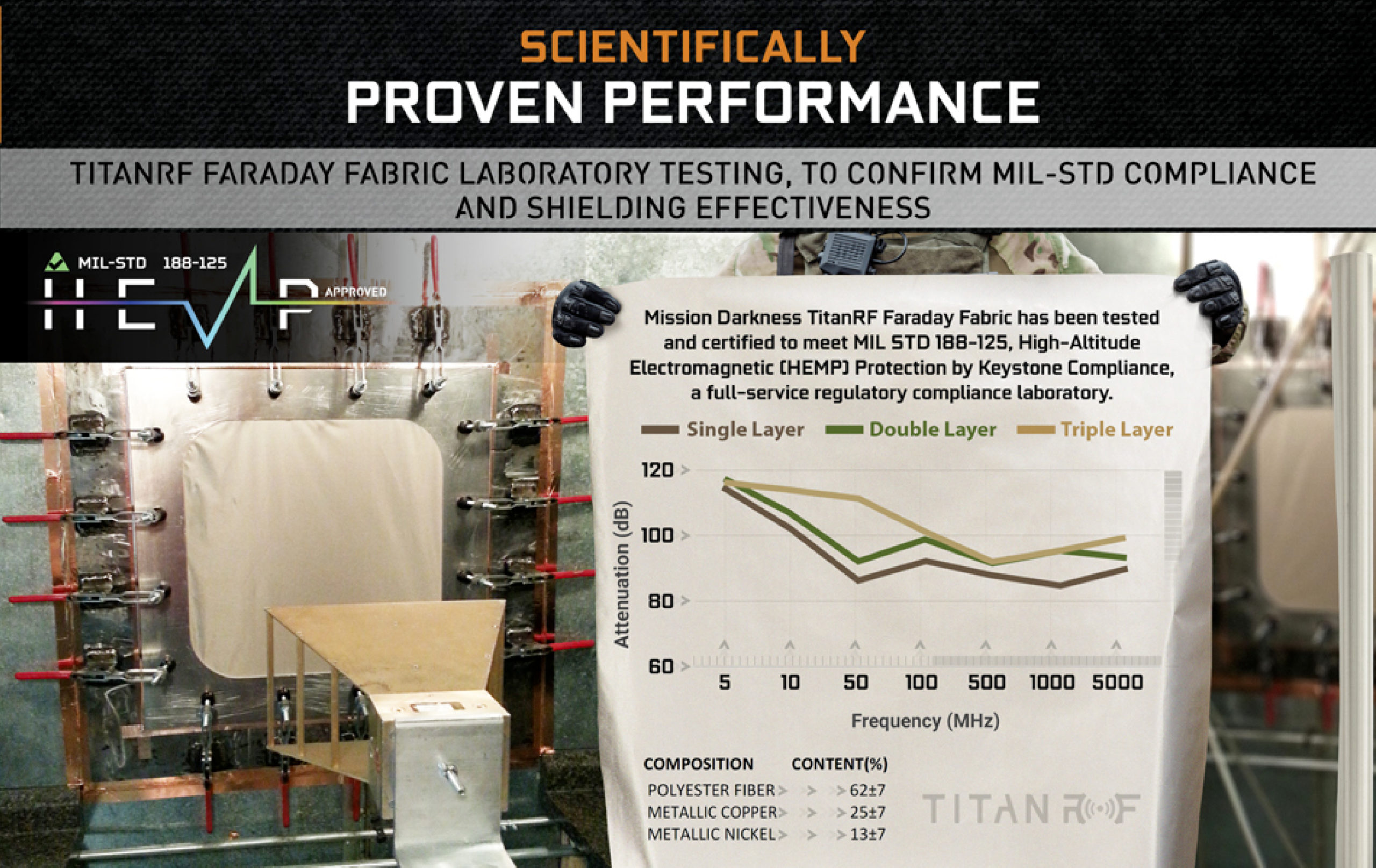

MIL STD 188-125 Tested on March 27, 2019
Multiple MIL STD 188-125 shielding effectiveness tests were performed to conclude that TitanRF Faraday Fabric is certified “compliant” for High-Altitude Electromagnetic Protection for Ground Based C41 Facilities. The results ensure that the material surpasses military shielding requirements to handle natural or man-made EMPs.
We tested single, double, and triple fabric layers to understand how fabric layering relates to the increase in signal attenuation. The graph above shows the shielding effectiveness results of various layers. *This should be taken into consideration when building your own faraday enclosure, to ensure that you are using enough layers for specific attenuation needs.
The frequency range investigated and all test results are noted in the report generated by Keystone Compliance.
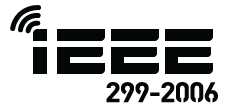
IEEE 299-2006 Tested on October 7, 2020
IEEE 299-2006 is the primary method for measuring the effectiveness of electromagnetic shielding enclosures and materials. The testing conducted was designed to accomplish the following three goals:
1. The first goal is to keep certain RF signals within the enclosure of the device.
2. The second goal of shielding effectiveness testing is to block external EMI from impacting the device under test.
3. The third objective is a combination of the two. A properly-shielded device will effectively retain all RF energy in its enclosure and keep all external RF isolated.
We tested single and double layers of TitanRF Faraday Fabric to understand how layering relates to an increase in signal attenuation. The frequency range investigated and all test results are noted in the report generated by Keystone Compliance.
Simple Steps for Creating Your Own Faraday Enclosure
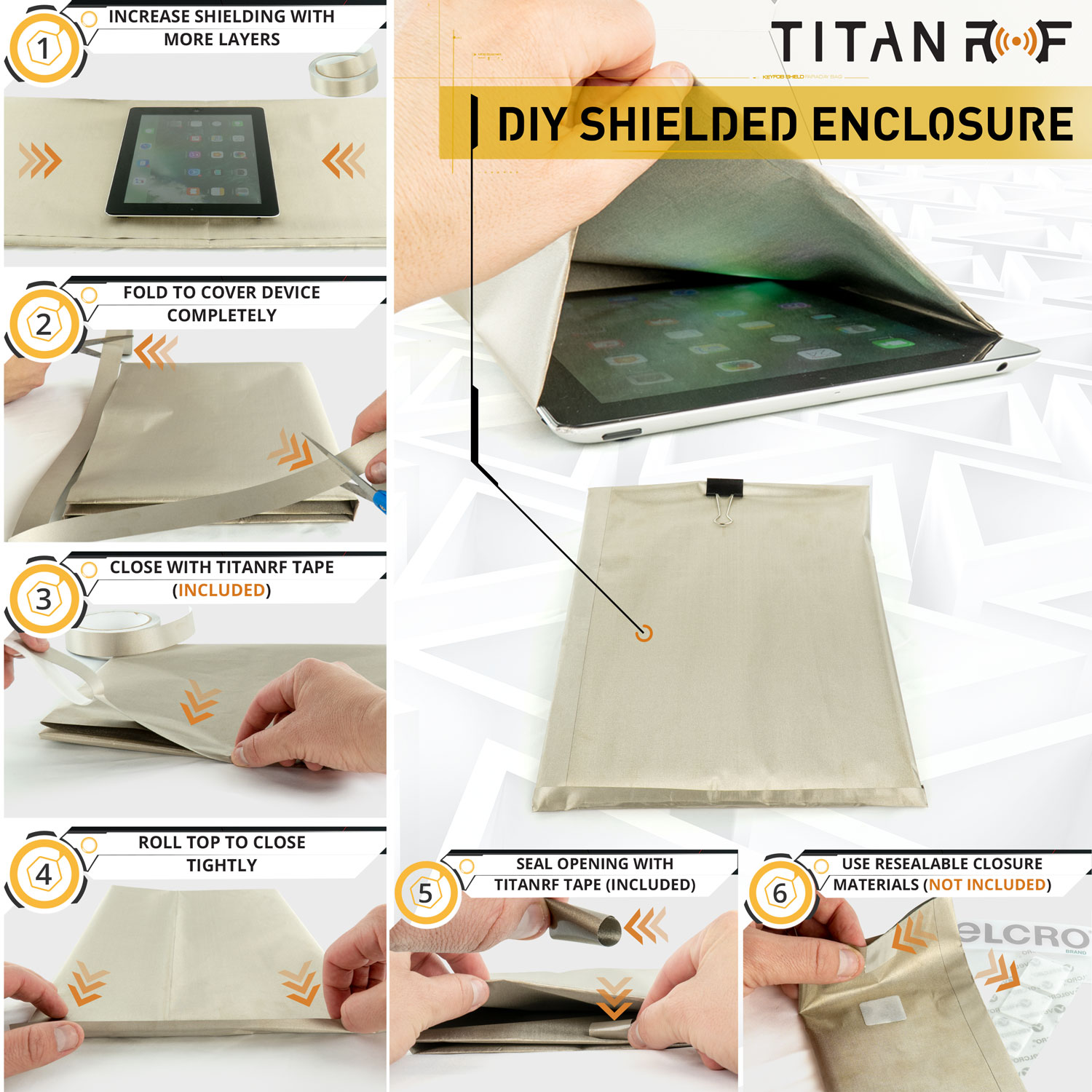
Complete Your Project With TitanRF Faraday Tape & Patches
Use TitanRF Faraday Tape and Patches alongside the fabric to complete your RF shielding enclosure or project. The Do-It-Yourself faraday enclosure video demonstrates how you can use the materials for projects such as making custom faraday cages, EMI/EMR reduction, sealing RF enclosures, connecting multiple sheets of fabric, mending a punctured faraday bag, and more. Read the section below for larger scale RF shielding construction project tips. TitanRF faraday supplies are available in various widths and lengths; purchase more materials as necessary for your project.
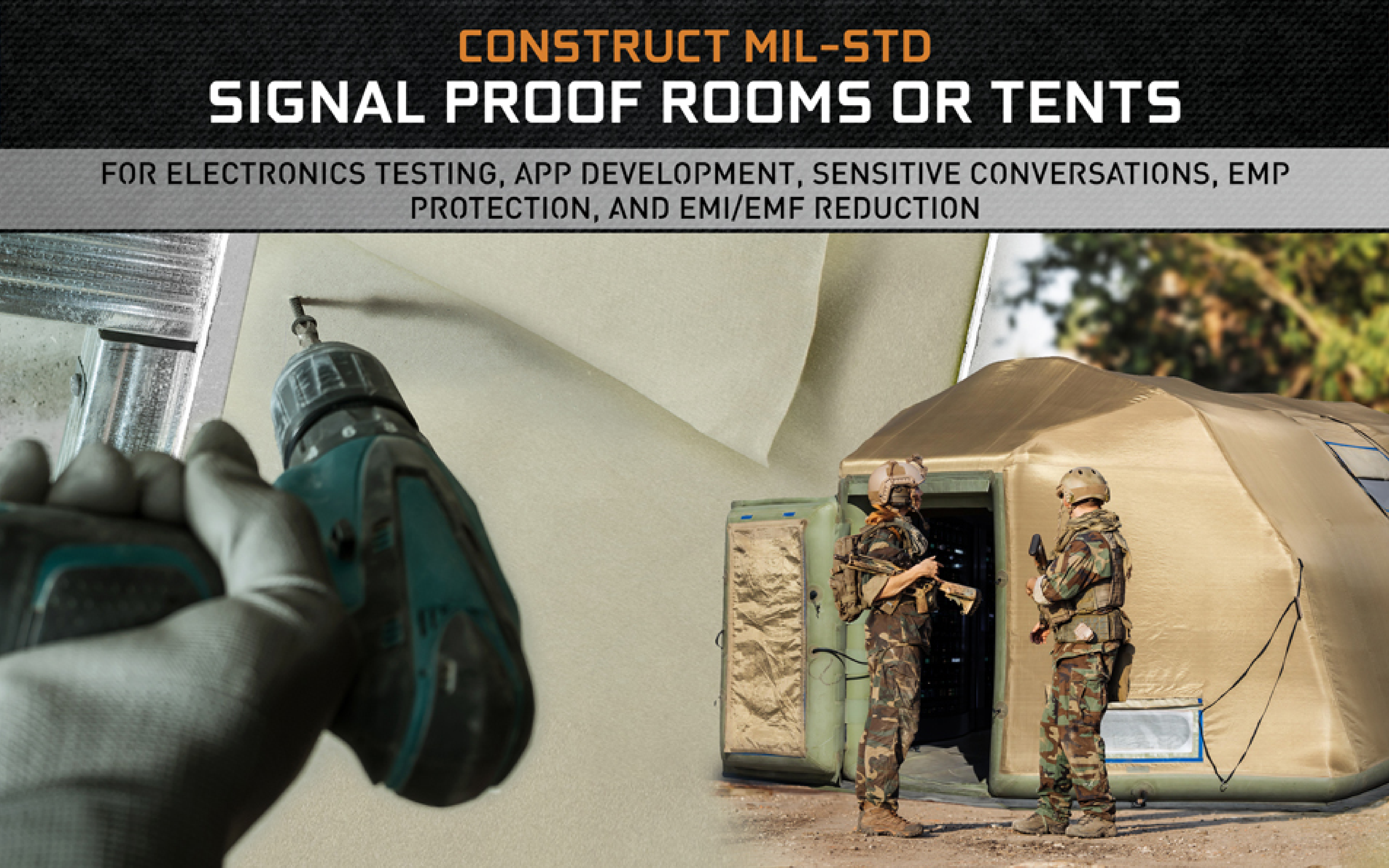
Using TitanRF Faraday Material in Construction, Faraday Rooms & Tents
TitanRF Faraday Fabric and Tape can be used for constructing signal proof rooms and tents. In order to create a fully shielded room, there cannot be any opening or holes, otherwise signal may penetrate. We recommend using two layers of fabric on the floor, ceiling, and walls, ensuring that the material is overlapping on all sides and seams. *Construction instructions are highly dependent on your specific application, and will vary depending on the size and type of room.
- For faraday cages or rooms designed only to store electronics, the construction may be simple since you will not need to take into consideration additional factors, such as windows and vents.
- For inhabitable faraday rooms or tents, you may need to incorporate additional components such as EMI/RFI shielded vents, windows, filters, etc., as well as a signal proof doorway. Read the tips below for further clarification into the items that need to be shielded.
Shielded Walls
You can use various construction methods to line the walls of your room or enclosure with TitanRF Faraday Fabric. Methods include placing the fabric between drywall, gluing it with a general contact adhesive (apply a thin layer and avoid using heavy adhesive), using TitanRF Faraday Tape to tape it in place or connect multiple fabric sheets, etc. Driving screws through the fabric may or may not be acceptable (use sparingly).
You can use the fabric to cover building materials such as dry wall. Use the TitanRF Faraday Tape to create/maintain a conductive seal and repair fabric punctures.
Shielded Outlets, Filters, Pipes, etc.
If your room requires power, HVAC, HDMI, RJ45, LAN, liquids, gases, etc., to pass through the walls, you will need shielded filters with wall mountings, feed-through pipes, and various other requirements. Specialized filters must be used in order to protect the room’s environment against electromagnetic disturbances.
Shielded Doorways
If incorporating a re-closable door, it must be able to properly seal with each use. Options include purchasing a shielded door/frame or creating your own. Generally you would need to seal the doorway with some kind of conductive sealing gasket to ensure signal blockage.
Shielded Air Vents
Shielded vents are required in order to allow the free-flow of air into a shielded room for ventilation and to prevent electromagnetic interference from entering the room. Mounting methods will vary depending on vent style and materials used throughout the project.
Shielded Transparent Windows
If you need shielded windows of some sort, options may include using transparent faraday fabric as a window covering, purchasing shielded windows/skylights/glass walls, etc. Attachment methods will depend on materials used.
Please be aware that these construction tips are only general. Many factors will effect the shielding effectiveness of your faraday room or tent. We recommend building a miniature room model beforehand to test your shielding materials and construction methods, then using the Mission Darkness testing app or a signal analyzer to determine if the design is effective. Contact us for additional tips tailed to your application and to further discuss the entire scope of your plan. We can provide full TitanRF Faraday Fabric rolls or custom lengths to meet the needs of your construction project; send us a message using the box below for a quote.

